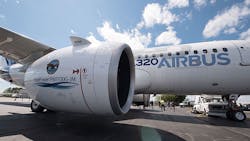Pratt to Supply Spare Engines as Turbofan Glitches Persist
Pratt & Whitney plans to reserve roughly 13% of this year’s production of its geared turbofan engines to replace faulty units as the manufacturer rushes to deal with a series of glitches.
As many as 42 Pratt engines, which propel Airbus Group SE’s A320neo jets, had to be removed prematurely around the world as of Feb. 24, according to India’s civil aviation regulator, citing combustion-chamber and bearing distress. India has the largest fleet of A320neos at present, and the country’s aviation regulator last month ordered two operators to inspect power plants with over 1,000 hours of service.
“Pratt & Whitney, with the support of Airbus, is in close contact with the Indian authorities to address technical issues and provide solutions in a timely manner,” the engine-maker said in an emailed response to queries. The company reaffirmed its annual production target for the engine. “We are actively working with our customers in India and are supporting them in their daily operations.”
After confronting a cooling issue and production foul-ups, the continuing problems have been a blow to the unit of United Technologies Corp. (IW 500/19), which has spent $10 billion developing the innovative GTF engine. Qatar Airways, which has refused to accept delivery of its Pratt-powered A320neos, is seeking to renegotiate its Airbus order and could switch to engines supplied by the rival CFM International alliance of General Electric Co. and Safran SA.
50 Spares
To get a handle on the issues, Pratt has already introduced modifications to the combustor, while additional upgrades are due by the end of the third quarter. The company is also testing a potential solution to a faulty oil seal that will allow on-wing fixes.
The plan is to build more than 50 “spare engines” this year, as part of an overall goal to produce 350 to 400 engines, the company said without elaborating. By reserving a large chunk of production for planes in service, the issue could weigh on delivery of new aircraft.
India is a crucial market for both Airbus and Pratt, with market leader IndiGo having ordered 430 of the A320neo jets and currently has 17 of the planes in service. Go Air has five in operation and was awaiting deliveries of 139 more as of February. State-run Air India flies two A320neos, but they are powered by CFM engines.
Shares of InterGlobe Aviation Ltd., which operates IndiGo, fell 2.8% as of 2:29 p.m. Tuesday in Mumbai and were poised for the biggest loss in almost two months. SpiceJet Ltd. rose 1.6%, versus a 0.6% gain in the benchmark S&P BSE Sensex.
At an industry conference in February, Akhil Johri, chief financial officer of Farmington, Conn.-based United Technologies, downplayed the issues as minor “teething problems” and said that they aren’t related to the engine’s central gear system, which is critical to dramatic cuts in fuel use, emissions and noise over previous-generation models.
By Anurag Kotoky and Andrea Rothman
About the Author
Bloomberg
Licensed content from Bloomberg, copyright 2016.
